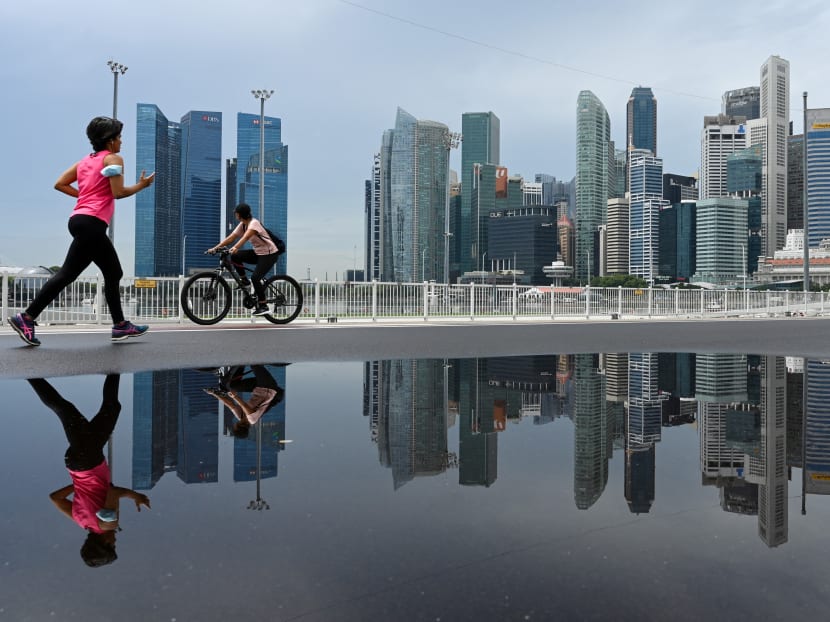Singapore economy posts higher than expected 7.6% growth in 2021: MTI
SINGAPORE — The Singapore economy grew by a higher than expected 7.6 per cent last year, the Ministry of Trade and Industry (MTI) said on Thursday (Feb 17), while the growth forecast for this year has been maintained at 3 to 5 per cent.

- The economic expansion in 2021 outstrips the 7.2 per cent growth projected in the Ministry of Trade and Industry's advanced estimate in January
- The growth was mainly driven by the manufacturing, finance and insurance and wholesale trade sectors, the ministry said
- Outward-oriented sectors, such as manufacturing and wholesale trade, will continue to expand due to sustained global demand
- Growth in the aviation and tourism-related sectors is expected to be slow due to recurring Covid-19 outbreaks and potential virus mutations
SINGAPORE — The Singapore economy grew by a higher-than-expected 7.6 per cent last year, the Ministry of Trade and Industry (MTI) said on Thursday (Feb 17), while the growth forecast for this year has been maintained at 3 to 5 per cent.
The economic expansion in 2021 outstrips the 7.2 per cent growth projected in MTI’s advanced estimate last month, and was mainly driven by the manufacturing, finance and insurance and wholesale trade sectors.
The 7.6 per cent expansion last year is also a rebound from the 4.1 per cent contraction in 2020, the ministry said in a statement.
In the fourth quarter last year, the economy expanded by 6.1 per cent on a year-on-year basis, higher than the advanced estimate of 5.9 per cent.
Over the last year, the manufacturing sector grew by 13.2 per cent, accelerating from the 7.5 per cent growth in 2020.
“Within the sector, output across all clusters rose, with the precision engineering, electronics and transport engineering clusters registering the largest output increases,” MTI said.
The construction sector expanded by 20.1 per cent, a sharp turnaround from the 38.4 per cent contraction in 2020, “supported by both public and private sector construction works”, MTI added.
The services-producing industries grew by 5.6 per cent, a reversal from the 5.1 per cent contraction in 2020. With the exception of the administrative and support services sector, all services sectors posted expansions.
Looking forward to this year, MTI noted that Singapore’s external demand outlook has “deteriorated slightly” as the global surge in Covid-19 cases caused by the spread of the Omicron coronavirus variant has led to a tightening of restrictions in many economies.
Among the downside risks facing the global economy are the potential emergence of more virulent strains of Covid-19 that “continues to pose a risk to the global economic recovery”, MTI said.
At the same time, Singapore’s high vaccination rate and steady roll-out of vaccine boosters should “facilitate further progressive easing of domestic and border restrictions”, and this will support the recovery of its consumer-facing sectors and alleviate labour shortages in sectors that are reliant on migrant workers.
MTI added that air travel and visitor arrivals are also expected to improve with the gradual loosening of travel restrictions and expansion of vaccinated travel lanes.
“Against this external and domestic backdrop, the Singapore economy is expected to continue to expand this year, although the outlook for the various sectors remains uneven.”
The growth prospects for outward-oriented sectors, such as manufacturing and wholesale trade, will remain strong given the continued global economic recovery. The manufacturing sector, for example, is projected to continue to expand, supported by sustained global demand for semiconductors and semiconductor equipment.
Growth in the information and communications, as well as the finance and insurance sectors, is expected to remain healthy, driven by strong demand for IT and digital solutions, and credit and payment processing services respectively.
However, the recovery of the aviation and tourism-related sectors, such as air transport and accommodation, is expected to be slow as recurring Covid-19 outbreaks and potential virus mutations could delay the lifting of travel restrictions globally, and travel demand is also likely to take time to recover, MTI said.
The accommodation sector will also be weighed down by a projected fall in domestic demand as government demand for hotel rooms to serve as quarantine facilities decreases, and staycation demand drops with the relaxation of travel restrictions.
“Overall, activity in these sectors is expected to remain below pre-Covid levels even by the end of 2022,” MTI said.
Consumer-facing sectors, such as retail trade and food-and-beverage (F&B) services, are projected to see a gradual recovery over the course of the year as domestic Covid-19 restrictions are progressively eased and “consumer sentiments improve amid the turnaround in labour market conditions”.
“However, the real value-added of the F&B services sector and some tourist-reliant segments of the retail trade sector are not expected to return to pre-Covid levels by end-2022, due in part to the slow recovery in visitor arrivals,” MTI added.
Activities in the construction, as well as marine and offshore engineering, sectors are projected to continue to recover on the back of the progressive easing of border restrictions on the entry of migrant workers from South Asia.
However, it will take time to fully address the shortfall in labour required to meet business needs, and labour shortages are likely to persist and weigh on the recovery of the sectors.
In particular, MTI said that the output of the construction sector is expected to remain below pre-pandemic levels throughout 2022.
“Taking into account the global and domestic economic environment, and barring the materialisation of downside risks in the global economy, the Singapore economy is projected to expand by 3 to 5 per cent in 2022,” the ministry said.











